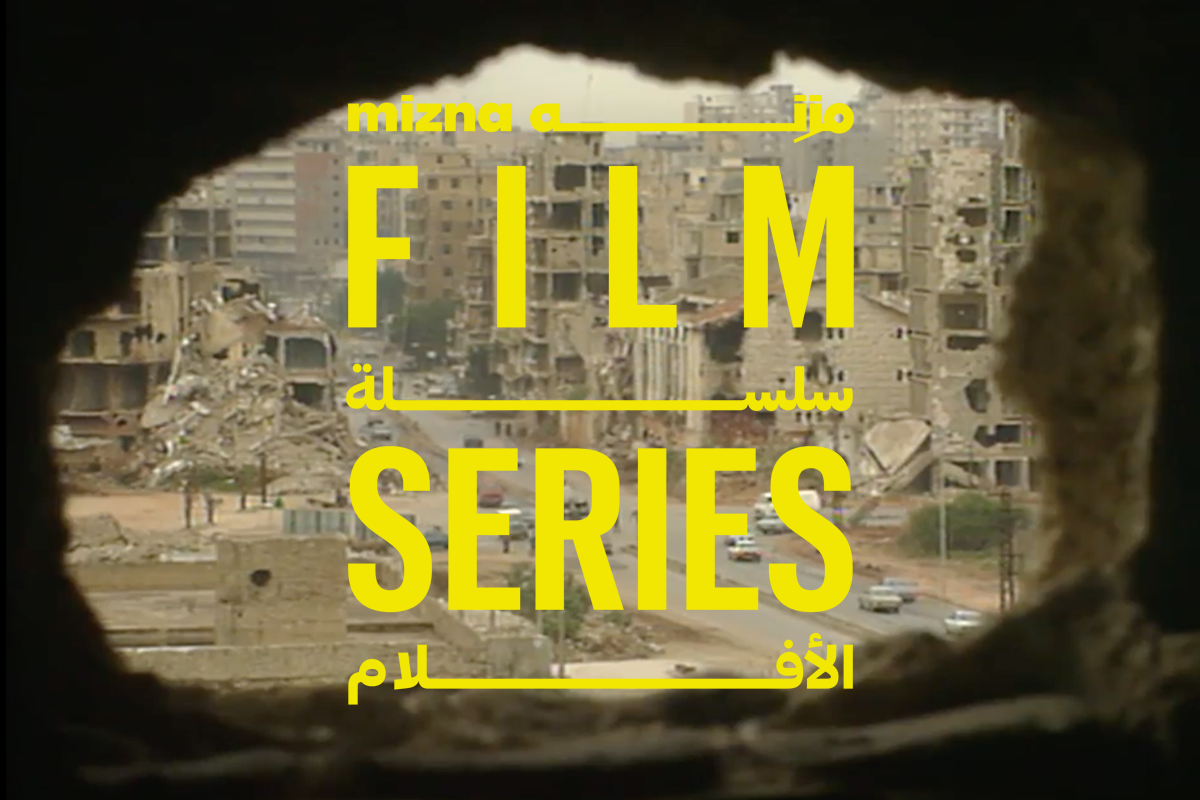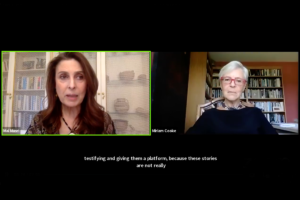
Mizna Film Series Summer 2021: Beirut
The Mizna Film Series is a monthly selection of programs, marking our first venture into year-round curated film programming. While our annual Film Fest focuses primarily on the works of contemporary artists, the Mizna Film Series provides a space to expand our regular film programming to include screenings, critical essays, filmmaker interviews, and discussions exploring revolutionary forms of cinema from the SWANA region and beyond. This series is presented virtually and in-person in collaboration with Trylon Cinema. Learn more about the Mizna Film Series here.
The Mizna Film Series continues its monthly program with a special Beirut-focused summer series. Encountering the real effects of destruction, the films in this series complicate the relationship between fact and fiction, using poetry and other forms of intermediality to witness what emerges from ruins. Beirut, a city that has often been the site of sectarian, colonialist and imperialist violence, is a context which produces films that critically engage with images related to moments during, between, and after war and upheaval.
At the center of this series is a retrospective of several early films by Jocelyne Saab, who uses documentary form to demonstrate the effects of violence in Lebanon and to challenge dominant western media perceptions and practices of filming and exhibiting war in Beirut. This series coincides with and honors the one year anniversary of the devastating Beirut Port explosion through the celebration of Lebanese filmmaking. Each monthly program is accompanied by online discussions and critical writing published on Mizna’s website.
Below is the full lineup for June–September 2021.
Tickets + Passes
In-person Trylon tickets: $10
Virtual Tickets: Pay what you can, $5 suggested donation
Virtual Pass (3-pack) : $20
PAST
June 23–27, 2021: YOUTH IN RESISTANCE
Two short documentaries by Jocelyne Saab shot near the beginning of the Lebanese Civil War and a feature-length documentary by Mai Masri and Jean Chamoun shot towards the end of the war in 1988 will screen this June. Central to these films are the youth of Beirut as they live with and resist imperialist and sectarian forms of violence.

PALESTINIAN WOMEN (dir. Jocelyne Saab, 1974)
In a short film originally commissioned by French television but never aired, Jocelyn Saab follows Palestinian women in Beirut at the peak of the Palestinian revolutionary movement. Saab interviews women in refugee camps, during their fida’ee training, and at university, offering an intimate look into the Palestinian resistance as a feminist, refugee, and class struggle.

CHILDREN OF WAR (dir. Jocelyne Saab, 1976)
Days after the 1976 Karantina massacre, perpetrated by right-wing Christian militias in a Palestinian slum near the port of Beirut, Jocelyne Saab meets a group of children who escaped the carnage. Saab gives the children, many of whom had lost family members in the massacre, crayons and encourages them to draw while she films. While filming, Saab makes a bitter discovery: mirroring what they were witnessing and experiencing in wartime, the only play the children engage in are war games. War games quickly bleed back into life.

WAR GENERATION – BEIRUT (dir. Mai Masri & Jean Chamoun, 1988)
Filmed on the streets of Beirut, War Generation – Beirut is a mesmerizing film that explores the life experiences of young people as they struggle to survive growing up in Lebanon’s capital city, ravaged by thirteen years of war. Featuring interviews with young people as they go about their daily lives, this award-winning documentary traces the nuanced history of Lebanon’s Civil War and the ways of life that have emerged from it.
In-person screening of Youth in Resistance takes place at Trylon Cinema on Wednesday, June 23, 2021 at 7pm.
Youth in Resistance is available virtually June 24–27, 2021.
June Programming

Read A Note On Jocelyne Saab And Screening Violence by Michelle Baroody
July 28-Aug 1, 2021: JOCELYNE SAAB’S BEIRUT TRILOGY
July will feature Jocelyne Saab’s Beirut trilogy, a series of landmark works in Lebanese cinema and masterpieces of the essay film form. Trained as a radio and television journalist, Saab turned her attention to documentary films at the start of the Lebanese Civil War. Saab’s commitment to and intimate interactions with the displaced, the exiled, and the dispossessed, mark her films and her quest to capture Beirut as uniquely her own.

BEIRUT, NEVER AGAIN (dir. Jocelyne Saab, 1976)
Every morning, when the nightly battles between militias have ceased, Jocelyne Saab roams around Beirut’s city center filming traces of daily life. Gunfire and song mix with a poetic voiceover written by the Lebanese writer and painter Etel Adnan. The city of Beirut has become a place where everyone, even children, have become soldiers, looters, and scavengers. Yet life persists.

LETTER FROM BEIRUT (dir. Jocelyne Saab, 1978)
Three years after the beginning of the Civil War, the filmmaker returns to her city for several months. Living between Lebanon and France, she tries to readapt to daily life in Beirut. Saab wanders the streets of the irrevocably changed city, rides buses, chats with refugees and peacekeepers, and reflects on the war’s toll during a brief moment of peace.

BEIRUT, MY CITY (dir. Jocelyne Saab, 1982)
Considered by Saab to be her most important film, Beirut My City returns Saab and her collaborator, the playwright and director Roger Assaf, to the shell of her 150-year-old childhood home following Israel’s July 1982 invasion. She films the aftermath of the Israeli siege, even capturing the intimate farewells as members of the Palestinian Liberation Organization withdraw from Beirut. The sound of Israeli jets are constant, yet Saab finds glimmers of hope and solidarity amidst the chaos.
July Programming

In conjunction with our Beirut-focused summer film series, Mizna presents a discussion on Lebanese aesthetics and the legacy of Jocelyne Saab with artist Rayyane Tabet and scholar Dr. Dalia Said Mostafa, moderated by artist and writer Lamia Abukhadra
This virtual discussion took place Friday, July 30, 2021 at 12pm CT.

Read ‘You Have To Treat An Image Like It Never Existed’: Jocelyne Saab’s Beirut Trilogy by Linda Mokdad
August 25-29, 2021: POST/PROTRACTED CIVIL WAR

SUSPENDED DREAMS (dir. Mai Masri & Jean Chamoun, 1992)
Suspended Dreams links the stories of four people who are attempting to reconstruct their lives after Lebanon’s long and devastating Civil War. The film follows two ex-militia fighters from Beirut, a woman searching for her missing husband, and a playwright from southern Lebanon. Each shares their lives and hardships in the aftermath of fifteen years of war.

A TRILOGY ON CITIES AND THEIR IMAGINAL COMPLEMENTS (dir. Jalal Toufic & Graziella Rizkallah Toufic, 2011–2016)
A trilogy of videos on cities that relate them to the realms with which they have the most affinity but that cannot be reached by these cities’ most characteristic modes of transportation (cars in Beirut, buses and Bosphorus ferries in Istanbul, and tramways, buses, ferries, and the metro in Hong Kong): the labyrinth for postwar Beirut, the Imaginal World (‘ālam al-khayāl) for Istanbul and its songs, and “Solaris” for Hong Kong. The trilogy presents a one- way trip to labyrinthine postwar Beirut; a two-way trip to Imaginal Istanbul; and a three-way trip to a Hong Kong colored by desirous projections.

NOW / MAINTENANT (dir. Ghassan Salhab, 2021)
In Ghassan Salhab’s recent short filmic poems and political documentaries, deliberately minimal images are used to make eloquent expressions of a desire for a new reality. As Salhab puts it: “The uprising in Lebanon was seriously starting to run out of steam; the first lockdown abruptly interrupted it, temporarily, we think. Now, as Bernard Noël wrote, we must raise our fists and fight the memory.”
Post/Protracted Civil War is available virtually August 26–29, 2021.
In-person screening of Post/Protracted Civil War takes place at Trylon Cinema on Wednesday, August 25, 2021 at 7pm.
August Programming

Mizna is presents a discussion between renowned filmmaker Mai Masri and scholar Miriam Cooke. Masri and Cooke will discuss Suspended Dreams, directed in 1992 by Masri and her late husband Jean Chamoun, as well as Masri’s filmography, which focuses on the real life struggles of the women and children living in the Occupied Palestinian and Lebanon.
This virtual discussion took place as part of the Mizna Film Series on Saturday, August 28.
September 22-26, 2021: BIRDS OF SEPTEMBER BY SARAH FRANCIS

A glassed van roams the streets of Beirut, home to a camera that explores the city behind the glass. Along the way, several people are invited to share a personal moment in this moving confessional. Each one comes as a face, a body, a posture, a voice, an attitude, an emotion, a point of view, a memory. Their confessions are true, blunt, and intimate. However, soon enough, the van empties again, and roams Beirut; restlessly looking for something, for someone.










